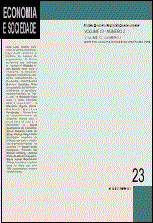Resumo
Este pequeno artigo discute as condições para sustentabilidade fiscal definida como uma relação estável entre dívida e produto. Mostra-se que as condições comumente utilizadas para definir sustentabilidade, notadamente uma taxa de juro real menor que a taxa de crescimento da renda, não são suficientes para uma relação dívida/PIB estável quando o governo tem acesso a receitas monetárias (senhoriagem). O papel exercido pelo mercado e as expectativas dos agentes econômicos, e as razões para a dificuldade de se estabelecer uma relação empírica entre déficits orçamentários e inflação são discutidos. Argumenta-se que a formação de expectativas sobre a consolidação fiscal e os efeitos da inflação sobre as contas públicas possam explicar essa dificuldade empírica, ainda que a redução ou eliminação de déficits orçamentários possa ser considerada um fato estilizado dos programas de estabilização que obtiveram sucesso.
Abstract
This note discusses the conditions for a sustainable fiscal policy defined as one that will result in a stable debt/income ratio. It is shown that the usually evoked condition for sustainability, that the real rate of interest be smaller than the rate of the income growth, is not a sufficient one when the government has access to revenue from seignorage collection. The role played by the market and expectations, and the reasons for the difficulties in establishing an empirical relationship between budget deficits and inflation reported in the literature are discussed. It is argued that the way expectations about fiscal consolidation are formed, and the effects of inflation on the government budget might explain the absence of a systematic relationship between deficits and inflation. Yet, despite the empirical results, the reduction or virtual elimination of budget deficits may be considered a stylized fact about successful stabilization programs.
Key words: Inflation. Deficit. Sustainability
Referências
AGHION, B.; HINESTROSA, P. Debt relief, growth and price stability in Mexico. Journal of Development Economics, v. 48, p. 135-149, 1995.
BARRO, R. Are government bonds net wealth? Journal of Political Economy, v. 84, p. 343-350, 1974.
________; GORDON, D. A positive theory of monetary policy in a natural-rate model. Journal of Political Economy, v. 91, n. 4, p. 589-610, 1983.
BENTAL, B.; ECKSTEIN, Z. The dynamics of inflation with constant deficit under expected regime change. The Economics Journal, v. 100, p. 1245-1260, 1990.
BLANCHARD, O.; FISCHER, S. Lectures on macroeconomics. Cambridge: The MIT Press, 1989.
BOHN, H. Budget deficits and government accounting. University of Pennsylvania, 1991. (Mimeogr.).
BRUNO, M., FISCHER, S. Seignorage, operating rules and the high inflation trap. Oct. 1987. (NBER Working Paper, 2413).
BUITER, W. Deficits, crowding out, and inflation: the simple analytics. 1983. (NBER Working Paper, 1078).
CALVO, G. Servicing the public debt: the role of expectations. The American Economic Review, v. 78, n. 4, p. 647-661, 1988.
CARDOSO, E. Deficit finance and monetary dynamics in Brazil and Mexico. Journal of Development Economics, v. 37, p. 173-197, 1992.
CUDDINGTON, J. Analyzing the sustainability of fiscal deficits in developing countries. Washington D.C.: Georgetown University, 1997. (Mimeogr.).
CUKIERMAN, A.; MELTZER, A. A positive theory of discretionary policy, the cost of democratic government and the benefits of a constitution. Economic Inquiry, v. 24, n. 3, p. 367-388, Jul. 1986.
DOMAR, E. The ‘burden of the debt’ and the national income. The American Economic Review, v. 34, p. 798-827, 1944.
DORNBUSH, R.; FISCHER, S. Stopping hyperinflations past and present. Weltwirtschaftliches Archiv, v. 122, n. 1, p. 1-47, 1986.
DRAZEN, A., HELPMAN, E. Inflationary consequences of anticipated macroeconomic policies. Quarterly Journal of Economics, 1988.
EISNER, R.; PIEPER, P. A new view of the federal debt and budget deficits. The American Economic Review, v. 74, n. 1, p. 11-29, 1984.
GOLDFAJN, I. . Há razões para duvidar de que a dívida pública no Brasil é sustentável? Notas Técnicas do Banco Central, 2002.
HARROD, R. (1948). Towards a dynamic economics. In: SEN, A. (Ed.). Growth economics. London: Penguin Books, 1971.
LABÁN, R.; STURZENEGGER, F. Fiscal conservatism as a response to the debt crisis. Journal of Development Economics, v. 45, p. 305-324, 1994.
LACHMAN, D. Budget deficits and the public debt in Sweden: the case for fiscal consolidation. IMF Staff Papers, v. 41, n. 3, p. 502-516, 1994.
MCCALLUM, B. Are bond-financed deficits inflationary? A Ricardian analysis. Journal of Political Economy, v. 94, n. 1, p. 123-135, 1984.
SARGENT, T. The end of four big inflations. In: Inflation, Ed. R. Hall. Chicago, University of Chicago Press. 1982 ________. Macroeconomic theory. 2. ed. New York: Academic Press Inc., 1987.
________; WALLACE, N. (1981). Some unpleasant monetarist arithmetic. In: PRESTON, M. (Ed.). The rational expectations revolution: readings from the front line. Cambridge: The MIT Press, 1994.
SIDRAUSKI, M. Rational choice and the patterns of growth in a monetary economy. The American Economic Review, Papers and Proceedings, v. 57, n. 2, p. 534-544, 1967.
A Economia e Sociedade utiliza a licença do Creative Commons (CC), preservando assim, a integridade dos artigos em ambiente de acesso aberto.

